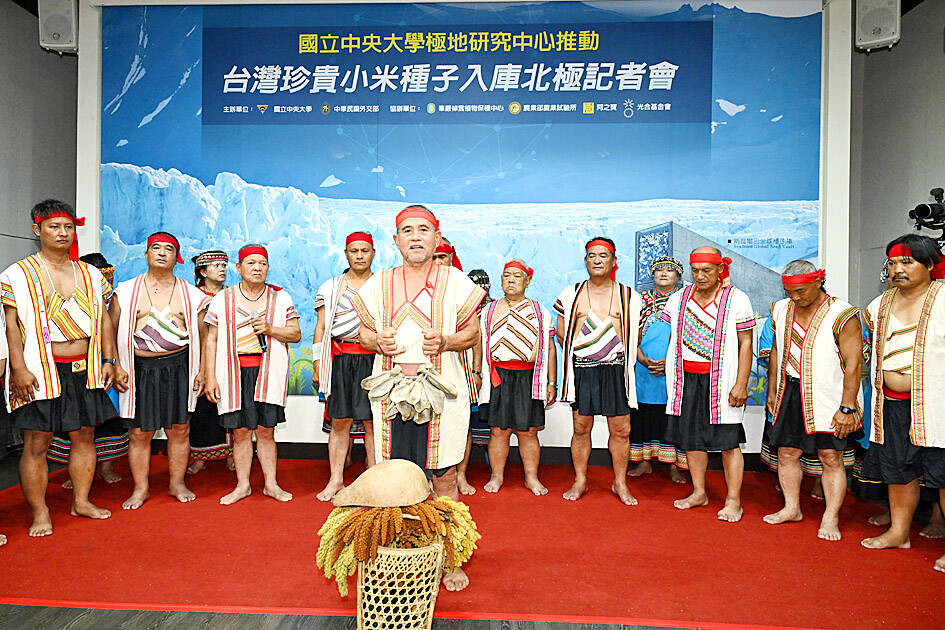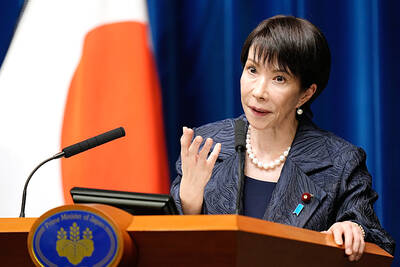Taiwan is to give samples of 170 millet species to the world’s “doomsday vault” in Svalbard, Norway, in case of extreme climate change, the Ministry of Foreign Affairs said yesterday.
A Taiwanese delegation is to travel to the Svalbard Global Seed Vault in the arctic circle to deliver the samples, the ministry said at a joint news conference in Taipei with National Central University’s Taiwan Polar Institute.
The millet seeds — the first of a series of crop seeds to be sent — would serve as a backup genetic resource to Taiwan’s domestic seed bank, the ministry said.

Photo: Chen Yi-kuan, Taipei Times
The project to preserve millet seeds at the Norway-owned genetic depository dubbed the “doomsday vault” marked a milestone in the nation’s efforts to promote international scientific cooperation and sustainable development, it said.
The vault is expected to receive the millet seed package on Wednesday next week, it said.
Millet is a staple for many indigenous Taiwanese cultures and features prominently in their rituals, said university president Jou Jing-yang (周景揚), who is expected to attend the event celebrating the seeds’ delivery.
The crop plays a key role in the nation’s food security and sustainable agriculture strategy against climate warming, Jou said.
Advances in technology and the economy would not change humanity’s need for food, said Lin Hsueh-shih (林學詩), director of the Ministry of Agriculture’s Taiwan Agricultural Research Institute.
The council of agriculture, the ministry’s predecessor, 31 years ago established a national seed bank to secure future generations’ food supply, Lin said, adding that the monthly electricity bill to operate it is NT$10 million (US$309,837).
In 2021, the UN named last year the International Year of Millets, recognizing that the staple’s resilience to droughts, floods and cold weather could be needed to deal with the implications of extreme climate change, he said.
Low water requirements, disease resistance, high nutritional value and not needing pesticides are among other qualities that make millet suitable for regions hard-struck by global warming, Lin said.
Making use of the seed bank in Norway means Taiwan would share the seeds with other nations in need, boosting sustainability globally, he added.
The Svalbard vault, which was built on Spitsbergen island in 2004, houses sample seeds for 4.5 million species of agricultural plants, the university said in a news release.
The island is the world’s northernmost permanent settlement, it added.
The vault, designed to survive an earthquake measuring 10 on the Richter scale and a nuclear explosion, is 2km from Taiwan’s artic station, it said.
Permafrost and modern facilities achieve cold storage at the seed bank, the university said.

The Ministry of Foreign Affairs (MOFA) yesterday voiced dissatisfaction with the Comprehensive and Progressive Agreement for Trans- Pacific Partnership (CPTPP), whose latest meeting, concluded earlier the same day, appeared not to address the country’s application. In a statement, MOFA said the CPTPP commission had "once again failed to fairly process Taiwan’s application," attributing the inaction to the bloc’s "succumbing to political pressure," without elaborating. Taiwan submitted its CPTPP application under the name "Separate Customs Territory of Taiwan, Penghu, Kinmen and Matsu" on Sept. 22, 2021 -- less than a week after China

THE GOOD WORD: More than 100 colleges on both sides of the Pacific will work together to bring students to Taiwan so they can learn Mandarin where it is spoken A total of 102 universities from Taiwan and the US are collaborating in a push to promote Taiwan as the first-choice place to learn Mandarin, with seven Mandarin learning centers stood up in the US to train and support teachers, the Foundation for International Cooperation in Higher Education of Taiwan (FICHET) said. At the annual convention of the American Council on the Teaching of Foreign Languages held over the weekend in New Orleans, Louisiana, a Taiwan Pavilion was jointly run by 17 representative teams from the FICHET, the Overseas Community Affairs Council, the Steering Committee for the Test of Proficiency-Huayu, the

A home-style restaurant opened by a Taiwanese woman in Quezon City in Metro Manila has been featured in the first-ever Michelin Guide honoring exceptional restaurants in the Philippines. The restaurant, Fong Wei Wu (豐味屋), was one of 74 eateries to receive a “Michelin Selected” honor in the guide, while one restaurant received two Michelin stars, eight received one star and 25 were awarded a “Bib Gourmand.” The guide, which was limited to restaurants in Metro Manila and Cebu, was published on Oct. 30. In an interview, Feng Wei Wu’s owner and chef, Linda, said that as a restaurateur in her 60s, receiving an

MORE RETALIATION: China would adopt a long-term pressure strategy to prevent other countries or future prime ministers following in Sanae Takaichi’s steps, an academic said Taiwan should maintain communications with Japan, as Japanese Prime Minister Sanae Takaichi is to lead a revision of security documents, Taiwanese academics said yesterday. Tensions have risen between Japan and China over remarks by Takaichi earlier this month that the use of force against Taiwan would constitute a “survival-threatening situation” for Japan. Prospect Foundation president Lai I-chung (賴怡忠) yesterday said Takaichi’s stance regarding Taiwan is the same as past Japanese prime ministers, but her position is clearer than that of her predecessors Fumio Kishida and Shigeru Ishiba. Although Japan views a “Taiwan contingency” as a “survival-threatening situation,” which would allow its military to